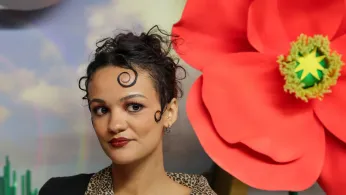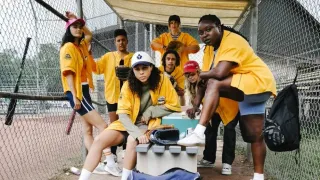
Sep 13
Marissa Bode, Pointing to Harmful Rhetoric, Won't Be Bullied into Mourning Charlie Kirk
READ TIME: 3 MIN.
The death of conservative commentator Charlie Kirk in a Utah shooting has reverberated across the United States and internationally, prompting an outpouring of tributes from many of his supporters and public figures. Vigils and online memorials have highlighted his controversial yet influential role in American conservative politics, where he was known for his uncompromising stances on issues ranging from gun rights to immigration policy. However, Kirk’s passing has also been met with pointed criticism from activists, media commentators, and members of marginalized communities who recall his record of incendiary remarks and advocacy.
Among the most prominent dissenting voices is Marissa Bode, an actress celebrated for her role in the Broadway production of “Wicked.” Bode’s refusal to participate in public mourning for Kirk has triggered a wave of debate, both within and outside LGBTQ+ spaces.
Speaking in a TikTok video that quickly went viral, Bode addressed the growing pressure to express sympathy for Kirk, stating plainly, “I won’t give into pressure not to call out Kirk’s racism, xenophobia, and misogyny.” She emphasized that Kirk’s career was defined by rhetoric that, in her view, directly harmed marginalized communities, including LGBTQ+ people, immigrants, and women.
In her public statement, Bode recounted specific examples—including Kirk’s previous comments dismissing the Civil Rights Act, advocating for gun rights even in the face of mass shootings, and celebrating violence against Palestinians. “Don’t forgive me for not being rah-rah that he’s gone,” Bode declared, adding that being a parent or a public figure does not absolve anyone of the harm they may have caused through their platform.
Bode also directly addressed her critics: “You don’t get to demand empathy from the very people whose rights you spent your life undermining.” Another quote from her TikTok post: "Being called hateful because I don't feel an ounce of sympathy for a man whose whole career was built on being a bigot? Wild work. Mental gymnastics."
Her forthrightness has resonated with many queer individuals who have long felt targeted by Kirk’s rhetoric.
Reactions to Bode’s stance have been sharply polarized. On platforms such as TikTok, Threads, and X (formerly Twitter), many LGBTQ+ users have praised her candor and refusal to normalize what they see as the whitewashing of Kirk’s legacy. One widely shared comment described Kirk’s death as “the natural consequence of the hostility he broadcast for years.” Others took note of the double standard inherent in Krik's supporters demanding empathy despite Kirk himself claiming that such feelings of fellowship are nothing but weakness.
However, there has also been backlash from conservative commentators and some public figures, who argue that refusing to mourn a political opponent is evidence of growing division and intolerance. Some have even accused Bode and others of “celebrating death,” claims that Bode has explicitly rejected, stating, “Not mourning is not the same as celebrating. It’s a refusal to respect a harmful legacy.”
Bode’s refusal to apologize has reignited a broader conversation within LGBTQ+ spaces about the ethics of mourning public figures who have contributed to the marginalization of vulnerable communities. Many LGBTQ+ advocates argue that calls for blanket empathy can serve to erase the real harm inflicted by public figures like Kirk.
In interviews with LGBTQ+ media, several activists pointed out that Kirk’s rhetoric and advocacy have had concrete consequences for transgender people, nonbinary people, and other LGBTQ+ identities, particularly in states where his influence helped shape anti-LGBTQ+ legislation. “Respecting the grief of his loved ones doesn’t require us to forget the pain he caused,” said one organizer, who called Bode’s refusal a necessary act of boundary-setting.
The debate has also drawn in other public figures. Makeup influencer Jeffree Star, for instance, took to TikTok Live to defend Kirk and criticize those refusing to mourn, including Bode. Star’s comments included attacks on nonbinary people, further fueling the conversation about who is being centered in discussions of public mourning.
The controversy illustrates a larger struggle over how communities choose to remember or repudiate public figures whose legacies are tied to discrimination or violence. Bode’s decision has become a flashpoint, with some commentators seeing it as emblematic of a growing refusal among queer people and allies to engage in what they see as performative empathy.
For many in the queer community, Bode’s stance signals a new willingness to prioritize accountability over calls for civility that can obscure real harm. “This isn’t about hatred. It’s about refusing to participate in the erasure of our own experiences,” wrote one popular queer activist on Threads.






